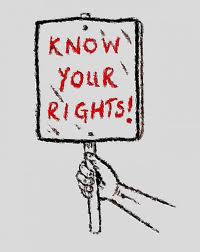
If you’re an employee, you have certain rights at work, such as the right not to be dismissed unfairly, and the right to redundancy pay.
These rights do not apply if you’re self-employed, an agency worker, casual worker or trainee. As a result, some employers may attempt to give you that status. This also means they don’t have to pay tax and national insurance for you.
But it doesn’t matter what they call you. It doesn’t even matter if you’ve signed a document saying you’re self-employed.
What determines whether or not you are an employee is what your employer expects you to do, who decides what work you do, and how you actually work in practice.
As an employee, you will have a contract of employment – even if it’s a verbal agreement that’s not written down.
How to tell whether you are an employee
- Does your employer control your work by providing the work and telling you how it should be done (even if you’re left alone to do it)? If yes, you could be employee. If you find your own work, you’re self-employed.
- Does your employer pay you a regular amount at regular intervals? If yes, you could be an employee. If you’re paid per job, you’re more likely to be self-employed.
- Does your employer find someone else to do your work in your absence? If yes, you could be an employee. If it’s up to you to find a sub-contractor when you’re off sick, for example, it indicates that you’re self-employed.
- Does your employer supply most of the main tools, machines and materials for you to do the work? If yes, you could be an employee. If you provide all your own tools, you’re probably self-employed.
- Do you get work through an agency? If yes, you may be an employee of the agency, or self-employed, or employed by the organisation you work for. In this case, there are special rules about how to decide whether you’re an employee or self-employed.
Your contract of employment
When you agree to work for your employer and they agree to pay you for your work, it forms a contract.
Your employer should give you a written contract within two months of you starting work, containing the terms and conditions that cover your rights and obligations. These are in addition to your legal rights, such as the right to be paid at least National Minimum Wage, and the right to paid holidays.
You are entitled to have an employment contract no matter how many hours you work each week. If your job lasts more than one month, you should receive one even if your job finishes before the two-month period is up.
If you haven’t received a written statement, it’s best to request it in writing and keep a copy.
As well as stating your name and your employer’s name, the title of the job and the date you started work, the contract of employment usually contains both express and implied terms.
Express terms
Express terms include:
- The hours you’ll work, including any overtime
- How much you’ll be paid, including any overtime and bonus payments
- Frequency of payment
- Location(s) where you’ll be working
- How much holiday you’re entitled to and how much you’ll be paid
- What pay you’ll receive if you’re off sick
- Details of the employer’s occupational pension scheme
- Disciplinary and grievance procedures
- Period of notice the employer will give you if you’re dismissed
- Period of notice you must given when you want to leave
- Amount you’d receive if you’re made redundant
These terms might not be written in the contract itself. They might be in the original job ad, a letter from your employer, displayed on your noticeboard at work, in an office manual or staff handbook, or shown on your payslip.
Implied terms
Implied terms are not specifically agreed between you and your employer, but include general terms implied in most contracts of employment, by custom and practice, or made between your employer and a trade union or staff association.
They cover issues such as:
- Duty of trust between you and your employer
- Duty of care between you, your employer, and other employees
- Duty to obey reasonable instructions your employer gives you
- Duty of your employer to pay your wages and provide work
Statutory rights
You also have certain rights enshrined in law, including:
- The right to a written employment contract
- The right to an itemised pay statement
- The right to maternity/paternity leave
- The right to a redundancy pay
- The right not to be dismissed unfairly
- The right to refuse work you believe to be dangerous
Breach of contract
If you or your employer doesn’t comply with a contract term, it’s known as ‘breach of contract’. For example, if they don’t pay you what they owe.
If this happens, you should first try to sort it out informally. If that doesn’t work, try raising a grievance. If that fails, then you should get advice from the Citizens’ Advice Bureau or an employment lawyer (hint, hint!).
Need help?
For a free initial review of your claim, call 0808 168 7288 or Make An Online Enquiry>.
We have already helped thousands of people to win millions of pounds in compensation.
You have a choice of ways to pay, including ‘no win, no fee’.
We will also discuss the best methods of funding your case and seek to reach a solution that best suits your needs. This can involve a “no-win, no-fee” agreement if appropriate.
